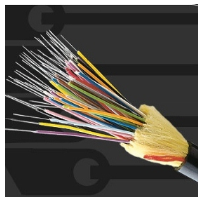AT&T Offers $250,000 Reward after More Fiber-Optic Cables Cut in Bay Area

If the Federal Bureau of Investigation (FBI) has any more information on who has been cutting fiber-optic cables across Alameda County the past year they didn’t let on when it was announced there were two more incidents near Livermore Monday.
Ars Technica said that brings to 16 either the number of acts of vandalism, revenge or incipient terrorism, depending on one’s own gut feeling. The FBI says it takes the incidents “very seriously” and on Wednesday AT&T offered a $250,000 reward for information leading to an arrest and conviction.
Ten of the first 11 incidents were at night, sometimes more than one within hours of each other. The first was in Berkeley at 9:44 p.m. on July 6, 2014. Another attack occurred nearly two hours later in Fremont. There were three more incidents the next day in Walnut Creek, Fremont and San Jose.
Fiber-optic cables use light pulses to convey data at high speeds for communication systems. They are used for phone service, television, internet connections and other computer transmissions. On Monday night, someone climbed down a manhole, cut through the metal casing engulfing the pencil-thick wires and clipped them. Customers lost Internet service for more than 24 hours until crews could repair the damage.
Although there is suspicion that the Bay Area incidents are related, they are not the only ones in the state. The Santa Rosa Press Democrat reported on September 3 that “vandals” severed an AT&T fiber-optic cable in Hopland, knocking out Internet, cellphone service and landlines across much of Mendocino and Humboldt counties and parts of Sonoma and Lake counties.
That incident apparently was caused by vandals, and not too bright ones, either. The vandals hacked their way through 700 feet of unstrung cable in an isolated area before realizing they did not contain the copper they sought. They fled. Wrong kind of wires.
The companies affected by the outage included AT&T, Verizon, Sonic and U.S. Cellular. The broad and sustained impact highlighted the fear among security-minded folk that someone was probing the nation’s communications infrastructure with a mind toward perpetrating something considerably more devastating.
The FBI does not link the recent incidents to one in April 2013 that had a distinctly different modus operandi. The day after the Boston Marathon attacks, a gunman or two entered manholes at a power station near San Jose and severed fiber-optic cables. Someone then pumped more than 100 rounds into several transformers with a high-speed rifle. Cooling oil leaked out and the overheated transformers shut down.
No weaponry was used in subsequent sabotage.
There are millions of miles of privately-owned fiber-optic cable in the world, much of it located in remote areas, unprotected from the most casual intrusion and assault. “You can spend a lot of money on encryption and fire walling, but you also need to cover the basics,” Ralph Descheneaux of Network Integrity Systems told Tech Times. “At the end of the day, if you don't protect the actual transport mechanism, you're always going to have a point of vulnerability.”
Roger Entner of Recon Analytics put that another way: “Our most critical infrastructure is basically unsecured.”
–Ken Broder
To Learn More:
More California Fiber Optic Cable Severed as AT&T Offers 250K Reward (by David Kravets, Ars Technica)
The FBI Is Still Hunting for California’s Fiber-Optic Cable Cutter (by Krystle Vermes, Digital Trends)
Attackers Sever Fiber-Optic Cables in San Francisco Area, Latest in a String (by Trevor Hughes, USA Today)
Vandalism Blamed for Massive Phone, Internet Outage on North Coast (by Martin Espinoza and Glenda Anderson, Santa Rosa Press Democrat)
“Vandals” Are Slicing Fiber-Optic Cables Around the Bay Area (by Ken Broder, AllGov California)
- Top Stories
- Controversies
- Where is the Money Going?
- California and the Nation
- Appointments and Resignations
- Unusual News
- Latest News
- California Forbids U.S. Immigration Agents from Pretending to be Police
- California Lawmakers Urged to Strip “Self-Dealing” Tax Board of Its Duties
- Big Oil’s Grip on California
- Santa Cruz Police See Homeland Security Betrayal in Use of Gang Roundup as Cover for Immigration Raid
- Oil Companies Face Deadline to Stop Polluting California Groundwater





